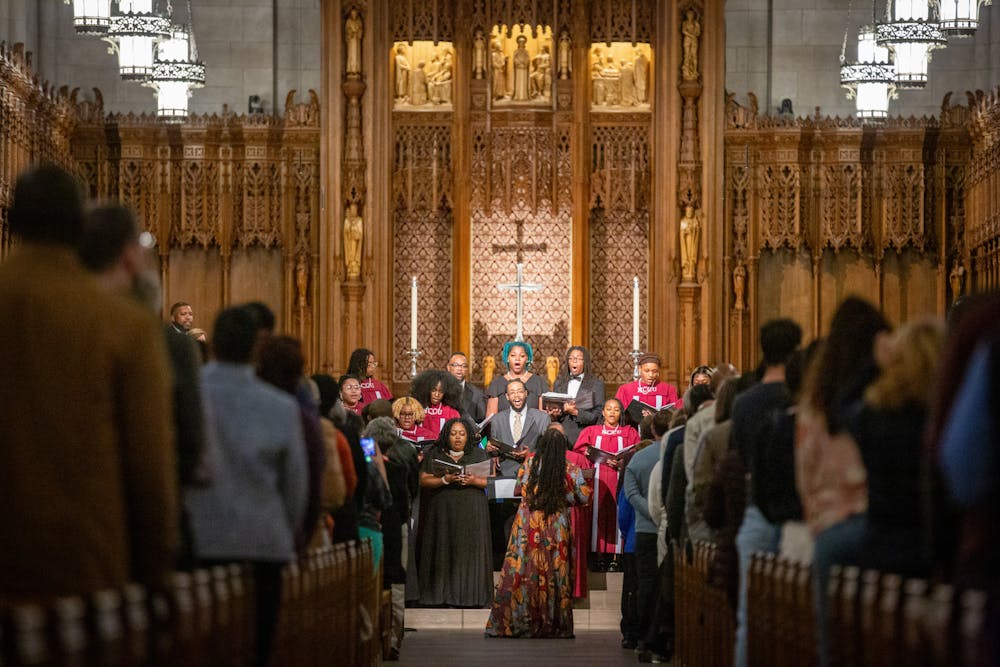Grant Hill, former men’s basketball star and Trinity ‘94, gave the keynote address at Sunday’s service of commemoration for Martin Luther King Jr. Day. The event brought together leaders from across Duke and Durham, who offered words of commitment and hope to an audience that filled the Chapel.
‘Ties may bind us, but tribes can blind us’
What is passion? Hill believes it fulfills our basic need for connection. For him, that often meant the passionate basketball rivalry between two Carolina universities.
Hill remarked that tribalism is a manifestation of passion, and it isn’t necessarily a bad one. Tribalism can bring out “our loyalty, our sense of responsibility to one another, our willingness to sacrifice for the common good,” he said.
Still, Hill noted that tribalism can also be a source of division, isolating people into bubbles and reaffirming their identities as members of the tribe in the process.
“Ties may bind us, but tribes can blind us,” he said.
Reflecting on the words of King, Hill delivered his keynote address on tribalism's beauty and faults. He ended his words with a call to expand the tribes that so often divide us.

Hill recalled the first moment he considered the meaning of passion. Walking through the entrance tunnels with his father, a former National Football League player, he was struck by what his father called the screaming, passionate audience members reaching out for an autograph — fans.
When Hill came to Duke, he learned about how passion manifests in a multitude of ways. Sports, for the athlete turned self-described soccer dad, holds up a mirror to society, and the common ground fans find through their support for a team is just one example of passion. We each have “love for our own tribe,” Hill said.
Hill emphasized the importance of honest conversations about tribalism, and the division that it may bring. He referenced his 2011 response to former Michigan guard Jalen Rose, who said that the ‘90s Duke basketball team “only recruited Black players that were Uncle Toms” in the ESPN documentary “The Fab Five.”
“I punched back by writing a long public letter defending my parents’ work ethic, my education and my pride in my identity as a Black man,” Hill said. “Now, with more than a decade of hindsight, I can see that yes, I soothed my bruised ego. But I didn't do anything to heal a real problem, like systemic inequalities at the heart of the point [Rose] was making.”
Hill alluded to divisions between Duke and Durham, physically represented by a wall surrounding East Campus, and the reputation of Duke students as being “out-of-towners” in Durham. Still, he noted that it was not always this way.
Durham used to be home to a thriving Black Wall Street, which was diminished by urban development projects following the ‘60s. While Duke-Durham initiatives have improved the relationship between the two communities, its historical divisions have left a mark, and Hill acknowledges that none of these programs make up for “generations of mistrust, tension and tribalism.”
Still, Hill feels that building this connection is a first step.
“Dr. King knew that progress is not sustainable unless it solves what is systemic, that peace, as he wrote, is more than merely the absence of tension,” Hill said. “So to fulfill our responsibility to repair, we have to change the way we see each other, which means changing how we see ourselves and the tribe to which we belong.”
“Does our tribalism define us, or do we define our tribe?”
Other speakers and performances
Hill’s remarks were joined by words from other members of the Duke community and musical tributes. Campus leaders paid tribute to King and delivered speeches and commitments inspired by his legacy, and performances by the John Brown Quintet, the North Carolina Central University Vocal Jazz Ensemble, the NCCU Choir and the Kizazi Alumni Chorale bookmarked the event.
Elana Friedman, campus rabbi and Jewish chaplain, and Dean of Duke Chapel Luke Powery opened the event, while Joshua Salaam, chaplain for the Center for Muslim Life, gave the benediction.
President Vincent Price, Durham mayor Leonardo Williams and Mary Klotman, dean of the School of Medicine, shared their own commitments in their welcoming addresses.
Price began his speech by referencing the time when King spoke at Page Auditorium in 1964, calling it “one of the most impactful moments in [Duke’s] history.”
Price said that King’s guidance was “especially resonant” as Duke marks it’s centennial year, presenting an opportunity to assess the University’s “progress in combating systemic racism” and clarify how the community “can and will do better.”
Williams identified love, principle and strength as some of the defining factors of King’s legacy. As a representative of Durham, Williams stressed the need to continue building on King’s dream as a community.
“Dreams are often meant to be made into reality. Let us take his dream and make it our reality,” he said. “Dr. King had a dream. We have an opportunity for our future to have a chance for us all to appreciate making this world a better place.”
Klotman noted that King “deeply understood that health and wellness are foundational to social justice and equality.” She highlighted that Duke Health was working to deepen this understanding and integrate his lessons into their teaching and research.
Junior Celeste Clark, president of the Black Student Alliance, advocated for a reframing of King’s legacy. While King is well-known for being a kind, vocal leader and an advocate for non-violent protests, she reminded the audience that he was also a revolutionary.
Clark ended her speech by calling upon the audience to continue King’s legacy and tradition, “a revolutionary love and radical change.”
“Do not leave the fight up to others, but progressively but productively advocate,” Clark said. “… I implore you to not just sit passively, but ask yourself what role can I play in enacting dramatic change, which is in itself revolutionary … and then when you leave here, take action because the path to progress is ongoing.”
Get The Chronicle straight to your inbox
Signup for our weekly newsletter. Cancel at any time.

Jothi Gupta is a Trinity sophomore and a university news editor of The Chronicle's 119th volume.

